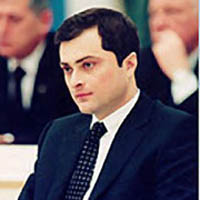Lost in translation: The English language as a way to make Russian political heroes
A well-said phrase may lead to unpredictable consequences. “When they talk about democracy they think about hydrocarbons,” deputy chairman of the Kremlin administration, Vladislav Surkov, said once in the summer of 2006 at a press briefing. When winter came, the official faced a harsh response to his remark in the form of an article written by The Wall Street Journal. The article was titled “Putin’s Pitchman.” A whole group of authors including “specialists of the Kremlin” Gregory White, Alan Cullison and Guy Cheisan tried to explain to US and Russian readers that Vladislav Surkov is a former assistant of the oligarchs, who builds dictatorship in Russia together with Putin. The article, which was quickly republished by the Vedomosti newspaper (published in Russia under WSJ’s control), also said that the USA has absolutely no interest in the Russian oil.

Most likely, the readers believed what US authors wrote taking into consideration the fact that their perception of Russia is based on chess player Garry Kasparov’s views. Mr. Kasparov regularly publishes his editorials in the WSJ titled “Putin Must Leave” or “If Western Leaders Congratulate Putin on His Election Victory, They Become His Companions in Crimes.” Furthermore, the newspaper continued its anti-Russian propaganda with Bret Stephens’ analytical “masterpiece” titled “Russia: The Enemy.” The author particularly wrote: “It is about time we should start referring to Putin’s Russia as the USA’s enemy.”
“Through his official spokesman Surkov refused to give interviews or answer a question by email,” WSJ journalists wrote, complaining of his ominous seclusion. This is a strange statement to make: Surkov has had many contacts with Western journalists during the recent year. We tried to find out the reasons of his refusal.
“Surkov declined comments to The Wall Street Journal journalists for one simple reason only: the newspaper deliberately distorts information about Russia,” a source from the Kremlin said. “This is a right that every person has. Communication is possible with any other respectable publication, but not with the newspaper that says that Russia is the enemy,” the source added.
Needless to say that any newspaper has a full right to express its opinion on everything and describe every public person as a “satrap” or a “despot” if there are certain facts to prove it. Taking into consideration the fact that the Russian press has never illustrated many events presented in the above-mentioned article, we decided to conduct an investigation of our own to find out to which extent the facts presented by US journalists are true to fact.
Let’s start from the very beginning, childhood that is. Following the propaganda of hypocrisy, US journalists wrote that Surkov was born to a family of a Chechen man and a Russian woman. To add more fuel to the fire, they wrote that the official was born as Dudayev (a Chechen name) and subsequently changed his name to Surkov before he became a student.
It was not hard for our correspondents to find out that a schoolboy named Vladislav Surkov was studying in two schools of the town of Skopin, the Ryazan region. When he turned 16, he became a holder of a USSR passport issued for the same family name. In Russia, a child bears his parents’ surname before he or she turns 16. Afterwards a person can change their names as they wish. However, a student named Vladislav Surkov became a student of the Moscow Institute of Steel and Alloys too. Surkov has always had this very family name and never changed it.
It is worthy of note that the questions of Vladislav Surkov's origin are quite popular among the liberal opposition, which is actually supposed to exemplify its tolerance. The Surkov-Dudayev tale was originally invented and promoted by Leonid Nevzlin (currently hiding from Russian law-enforcement authorities in Israel) and Stanislav Belkovsky, a mastermind of the Other Russia movement.
They attracted another doubtful newsmaker as an “expert” in ethics and morality. “The gene of cynicism developed in humans before the gene of democracy,” Aleskei Kondaurov wrote for WSJ. The newspaper wrote that Kondaurov used to work with Surkov in a bank. However, the newspaper did not specify that Kondaurov was not just a bank clerk, but a former KGB general, who used to serve in the notorious 5th Department (chaired by legendary Phillip Bobkov) which fought against dissidents. Having finished his practice in the KGB, Aleksei Kondaurov started deriving the “gene of democracy” as one of the managers of security service of Russia’s former oil giant Yukos. It is worth mentioning that the chairman of this service, Leonid Nevzlin, is currently accused of organizing a series of assassinations.
Moreover, Anatoly Yermolin, a retired lieutenant colonel, a graduate of the KGB Institute of the USSR, became an expert of parliamentarism for US authors. This person, a former member of the administration of Mikhail Khodorkovsky’s Open Russia Foundation, found himself in the State Duma owing to Yukos’s efforts. Yermolin filed a complaint to the Office of the Public Prosecutor and the Constitution Court saying that Vladislav Surkov and deputies of the United Russia faction had a fight with voters at a work session screaming “Vote as you are being told to!” The story proved to be untrue soon afterwards. Other people participating in the meeting rebutted Mr. Yermolin’s timely recollection. We said “timely” because it was just the time when Leonid Nevzlin’s PR service used several media outlets to attack Surkov in the summer of 2004, heralding his upcoming dismissal.
The flexible lieutenant colonel and his “truthful recollections” were then used again as an expert source for the “trustful” US newspaper, which apparently likes to be deceived. It seems rather surprising that the newspaper globally recognized for its rule to recheck every piece of information with two or three independent sources decided to keep only one witness in the person of a deputy whose previous work experience was closely connected with special services. It may also happen that the words from other sources did not correspond to what the journalists intended to say in their article.
Apparently, the authors were fascinated by their other source – former TV journalist Sergei Dorenko. Mr. Dorenko has something to be proud of: he is the only person in Russia having the reputation of a telekiller. With his paycheck of one million dollars that he received from generous oligarch in disgrace Boris Berezovsky, Dorenko masterfully drove Prime Minister Yevgeni Primakov and Moscow Mayor Yuri Luzhkov to preinfarction angina. The TV journalist simply concocted the facts for his own story: the court and numerous jokes on the matter confirmed it afterwards.
The US authors did not find time to dig something from the recent past. The story of TV journalists Sergei Dorenko from The First Channel and Yevgeni Kiselev from NTV are connected with the information war waged between oligarchs Boris Berezovsky and Vladimir Gusinsky. Dorenko was defaming Gusinsky’s political and business partners, whereas Kiselev was broadcasting his ownresponseagainst Berezovsky.
When the two oligarchs lost the two TV channels, Dorenko and Kiselev vanished from TV screens immediately. The end of Dorenko’s career on television coincided with a very unpleasant incident. He went on trial for driving a motorbike in a state of alcoholic intoxication and running over a pedestrian. The courageous “telekiller” escaped from the scene of the crime. Dorenko was sentenced to several years on parole – the mild sentence, which he most likely earned with the help of the Kremlin.
The subject of the “Kremlin offices” so to speak raises serious concerns with those who try to paint Vladislav Surkov black. A deputy with “democratic views,” Vladimir Ryzhkov, made his own contribution to the US public. Ryzhkov particularly said that Surkov invited him to his office in the Kremlin and promised him a fortune for his agreement to join the Unity faction. Ryzhkov proudly declined the offer, of course, and added that he had never spoken with Surkov after that. There is another version of the story in the Russian political circles. When the elections of 1999 were over, Ryzhkov was begging Surkov to make him a member of Unity. Our sources say that the impulsive young democrat was ready to kneel for that membership, but never managed to obtain it.
We wish The Wall Street Journal had newsmakers in the check point of the Kremlin to find out how many times the “democratic deputy” entered the Kremlin territory on the passes issued by Surkov’s office. In 2004 Mikhail Zadornov and Vladimir Ryzhkov initiated another political project called The Democratic Alternative. The two gentlemen visited Surkov’s office asking for assistance: they wanted United Russia deputies in their club. Rumor has it that Surkov’s answer was short and democratic: “Go to the party,” said he. Brushing all other details aside, Vladimir Ryzhkov is a public opponent of the Kremlin, who never goes to the Kremlin offices, the WSJ wrote.
Most likely, the phantoms of democracy seemed to be a lot nicer to the US journalists as opposed to facts and numbers. The description of Mr. Surkov as the “oppressor of freedom” wouldn’t be possible to make otherwise. It is much easier for them to use the words of another newsmaker, Dmitry Rogozin, and describe the discrediting of the former leader of the patriotic party Rodina (Fatherland), Dmitry Rogozin, who is being called “fascist and racist.” The US authors are not interested in the fact that the Moscow City Court denied Rodina’s participation in the election campaign in the fall of 2005 for inciting international strife. The court’s ruling was subsequently confirmed by the Supreme Court of the Russian Federation. Nevertheless, if Mr. Rogozin put on a Ku Klux Klan overall and participated in the making of a pre-election video and urged everyone to clean New York of the garbage, they would probably say something on the matter. If not, then they prefer to think of it as distant, wild and non-democratic Russia.
As a matter of fact, the biggest problem for all characters mentioned in the publication of The Wall Street Journal is the fact that it has been published here. Many of those people who were used as the basis of the logic construction of the WSJ’s article would never say anything that was written in it. If they had, they would have lost the heroic spirit which they pretend to have due to the imaginary danger of opposition in Russia. In this case they can refer to the supposed difficulties in translation. The point is about the facts, but not estimations.
Natalia Evgrafova
Izvestia
Subscribe to Pravda.Ru Telegram channel, Facebook, RSS!


